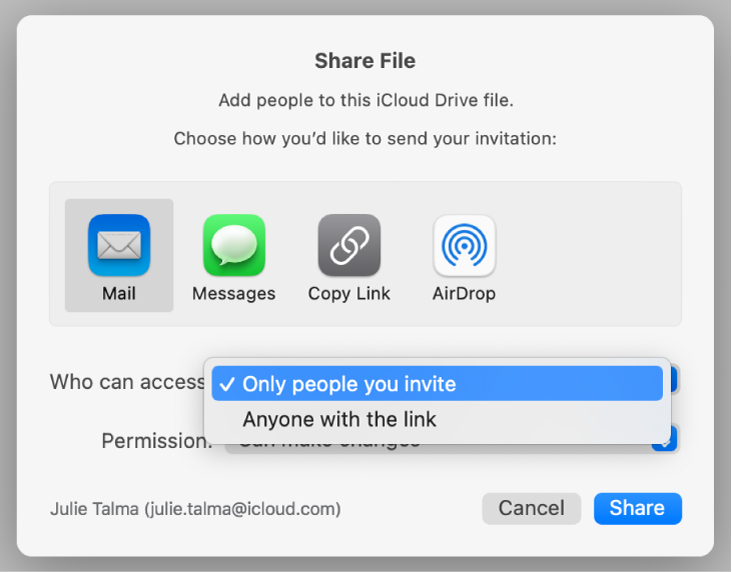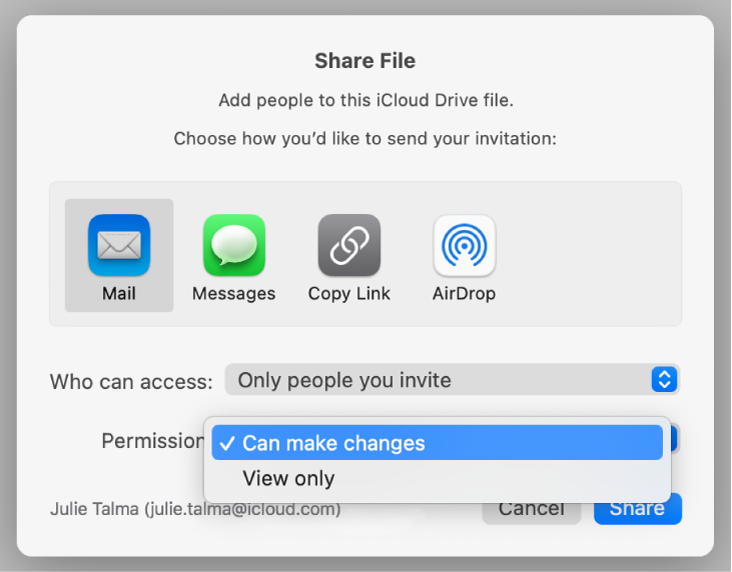
Invite others to collaborate in Keynote on Mac
You can invite others to work with you on a presentation in real time by sending them a link to it. Everyone working on the presentation can see changes as they’re made.
By default, only the people you invite to collaborate on the presentation can access and make changes to it. You can instead allow anyone who has the link to access the presentation. If you don’t want others to make changes, you can set the presentation permission to view only.
Invite people to collaborate
These instructions assume that you’re signed in to your computer with your Apple ID and Keynote is set up to use iCloud Drive.
Click
 in the Keynote toolbar.
in the Keynote toolbar.If the presentation isn’t stored in iCloud Drive, you see a prompt to move it there.
Click the “Who can access” pop-up menu, then choose an option:

Only people you invite: Only people who sign in with an Apple ID can open the presentation. People don’t need to have an Apple ID before you invite them; however, they need to create one before they can open your shared presentation.
If you invite someone using an email address or phone number that isn’t associated with their Apple ID, they won’t be able to accept the invitation until they add the email address or phone number to their Apple ID. Instructions are provided when they tap or click the link in the invitation.
Anyone with the link: Anyone who has the link to the shared presentation can tap or click the link to open the presentation. To protect it with a password, click Add Password.
If this presentation already has a password, it applies to the shared presentation as well, so you don’t need to enter a new one. If you want to change it, click Change Password.
Click the Permission pop-up menu, then choose an option:

Can make changes: People can edit and print the shared presentation.
View only: People can view and print the shared presentation but not edit it.
If you set access to “Only people you invite” (in step 2), you can change individual permission settings after you share the presentation.
Click a method for sending the link:
Mail or Messages: Click Share, then type one or more email addresses or phone numbers. Add any information you want to include, then click Send.
An internet service: To send the link using a service like Twitter, that account must already be set up on your Mac. Click the button for the service, then do one of the following:
If presentation access is set to “Only people you invite”: Enter the email addresses or phone numbers of people you want to invite, then click Share. Add any information you want to include, then click Post.
If presentation access is set to “Anyone with the link”: Click Share, enter the email addresses or phone numbers (if requested), then send or post the link.
Note: To set up a service, choose Apple menu > System Preferences, then click Internet Accounts. To use a service that’s not listed, click Copy Link, open the app where you want to share it, then choose Edit > Paste, or press Command-V on your keyboard.
Important: When you click Share, a link to the presentation (which includes its title) is created on iCloud. If the title or content of the presentation is confidential, be sure to ask recipients not to forward the link to anyone else.
The link appears in the body of the email, message, or post along with the presentation title—be sure not to edit or delete it.
After you share a presentation, a checkmark appears on the Collaborate button ![]() to indicate the presentation is shared.
to indicate the presentation is shared.
Invite more people
If you’re the owner of a shared presentation whose access is set to “Only people you invite,” you can invite more people.
Note: If the presentation access is set to “Anyone with the link,” you can’t invite new people as described in this task. Instead, simply send them the link (see the next task).
Click
 in the toolbar, then click Add People at the bottom of the participant list.
in the toolbar, then click Add People at the bottom of the participant list.Click the Permission pop-up menu, then set permission for the new people.
This setting affects only the new people you’re about to invite; it doesn’t change the permission of those you’ve already invited.
Click a method for sending the link, then click Continue.
The link may appear in the body of the email, message, or post as a stylized graphic with the presentation title—be sure not to edit or delete it.
You can change individual permission for the new people after you send or post the link.
For details on setting permission and sending the link, see “Invite people to collaborate,” above.
Send the link to more people
If your presentation access is set to “Anyone with the link,” you can give new people access to the presentation simply by sending them the presentation link.
Note: If the presentation access is set to “Only people you invite,” you add new people by sending them an invitation to collaborate (see the task above).
Click
 in the toolbar, then click Send Link.
in the toolbar, then click Send Link.Click a method for sending the link, then click Continue.
Address the email, message, or post, then send or post the link.
For details on sending the link, see “Invite people to collaborate,” above.
Copy and paste the link
If you’re the owner of a shared presentation, or if you’re collaborating on a presentation whose access is set to “Anyone with the link,” you can copy the shared presentation link and paste it somewhere else. You might want to do this, for example, to save the link where you can easily access it.
If the owner limited access to only people they invite, the link only works for invited participants.
Click
 in the toolbar, then do one of the following:
in the toolbar, then do one of the following:Click Copy Link (or if you’re the owner, click Share Options, then click Copy Link). You see this option if the presentation was shared only by invitation.
Click Send Link, click Copy Link, then click Continue. You see this option if the presentation was shared with anyone who has the link.
Click where you want to paste the link, then choose Edit > Paste (from the Edit menu at the top of your screen), or press Command-V on your keyboard.
Tip: You can also post the shared link on a website that supports embedded Keynote presentations (such as Medium or WordPress) so that viewers can navigate through the presentation in a player on the website. See Post your presentation in a blog with Keynote on Mac.
If the presentation is protected by a password, for security reasons don’t send the password with the link.